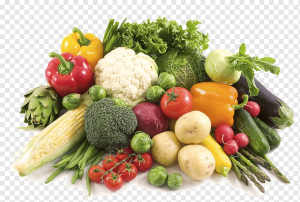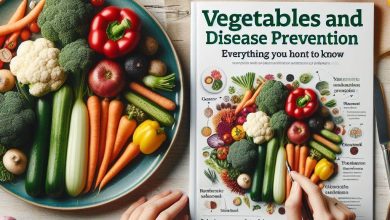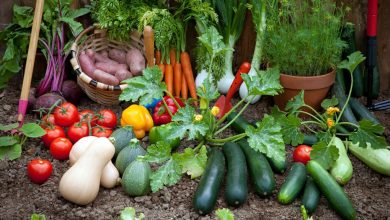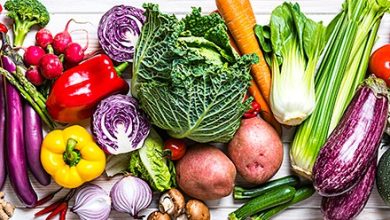The Green Revolution: Harnessing the Power of Vegetables for Optimal Health
The Green Revolution

Introduction:
Vegetables play an important part in the quest for a lively and healthy existence. These vibrant, nutrient-dense marvels of nature provide a host of health advantages beyond simple nourishment. This blog article delves into the varied realm of vegetables, examining their nutritional worth, the health advantages supported by science, and practical advice on including them in your regular diet.
Nutrient-Rich Powerhouses: Understanding the Bounty of Vitamins and Minerals
Every vegetable has a different combination of nutrients to offer, such as potassium in leafy greens, vitamin C in bell peppers, and vitamin A in carrots.
Key Nutrients Found in Vegetables:
a. Fiber: Rich in nutritional fiber, vegetables support healthy digestion, control blood sugar, and help with weight management.
b. Antioxidants: Vegetables, being high in antioxidants like beta-carotene, flavonoids, and vitamin C, aid in the fight against oxidative stress, lower inflammation, and shield cells from harm.
Heart Health and Vegetables: A Symbiotic Relationship
Leafy greens with chemicals that enhance cardiovascular health, such as kale and spinach, are especially useful.
Heart-Healthy Vegetables:
a. Leafy Greens: Rich in vitamins, minerals, and antioxidants that support heart health include spinach, kale, and Swiss chard.
b. Tomatoes: Tomatoes, being high in lycopene, have been associated with a lower risk of heart disease via enhancing lipid profiles.
c. Broccoli: Broccoli is a cruciferous vegetable that includes sulforaphane, which has been demonstrated to have heart-protective and anti-inflammatory properties.
Accepting the many gifts of nature’s garden while we negotiate the complexity of contemporary life is a straightforward yet effective decision to cultivate good health. The green revolution in health starts on your plate, so let it be a painting of vivid hues and let your meals be a celebration of the varied and wonderful world of veggies.


Weight Management and Vegetables: The Secret to Satiety
When it comes to controlling their weight, veggies are a dieter’s best friend. They are high in fiber and low in calories, so they satisfy hunger without adding extra calories. Including a range of vibrant veggies in meals enhances their flavor and texture while also helping with weight reduction and maintenance.
Weight-Friendly Vegetables:
a. Bell Peppers: Bell peppers are a colorful, crunchy food that is high in vitamin C, low in calories, and tasty.
b. Cauliflower: Cauliflower is a versatile vegetable that may be used to make low-calorie substitutes for mashed potatoes or rice, helping with calorie-conscious meal planning.
c. Zucchini: Spinning zucchini into “zoodles” is a nutritious way to enjoy this low-calorie, mildly flavorful vegetable that may replace pasta.
Digestive Health: Embracing Fiber-Rich Vegetables
Vegetables are among the finest providers of fiber, an important nutrient that is often overlooked in the context of digestive health. While insoluble fiber adds weight and keeps you from becoming constipated, soluble fiber helps to soften stools and regulate bowel motions. In addition to supporting a healthy gut flora, a high-fiber diet also improves digestive health in general.
Fiber-Rich Vegetables:
a. Brussels Sprouts: A healthy digestive tract is supported by the high fiber content of these cruciferous veggies.
b. Sweet Potatoes: Sweet potatoes are high in fiber and a fantastic source of vitamins, which helps maintain gut health and regular bowel movements.
Cancer Prevention: The Protective Role of Vegetables
A potent mix of vitamins, phytochemicals, and antioxidants found in vegetables has been linked to a decreased risk of acquiring a number of cancer forms. In particular, compounds found in cruciferous vegetables may help inhibit the growth of cancer cells.
Cancer-Fighting Vegetables:
a. Broccoli and Cauliflower: These cruciferous veggies, which are high in sulforaphane, have demonstrated encouraging anti-cancer effects.
b. Carrots: Carrots, which are high in beta-carotene, may lower the chance of developing lung and colorectal cancer, among other malignancies.
c. Garlic: Garlic is well-known for strengthening the immune system and for containing allicin, a substance that may have anti-cancer qualities.
Conclusion:
Vegetables are the colorful threads that connect physical health, illness prevention, and mental vigor in the vivid tapestry of a healthy living. Every vegetable, from the earthy richness of spinach to the crisp crunch of bell peppers, has a distinct flavor and nutritional value.


Accepting the many gifts of nature’s garden while we negotiate the complexity of contemporary life is a straightforward yet effective decision to cultivate good health. The green revolution in health starts on your plate, so let it be a painting of vivid hues and let your meals be a celebration of the varied and wonderful world of veggies.





